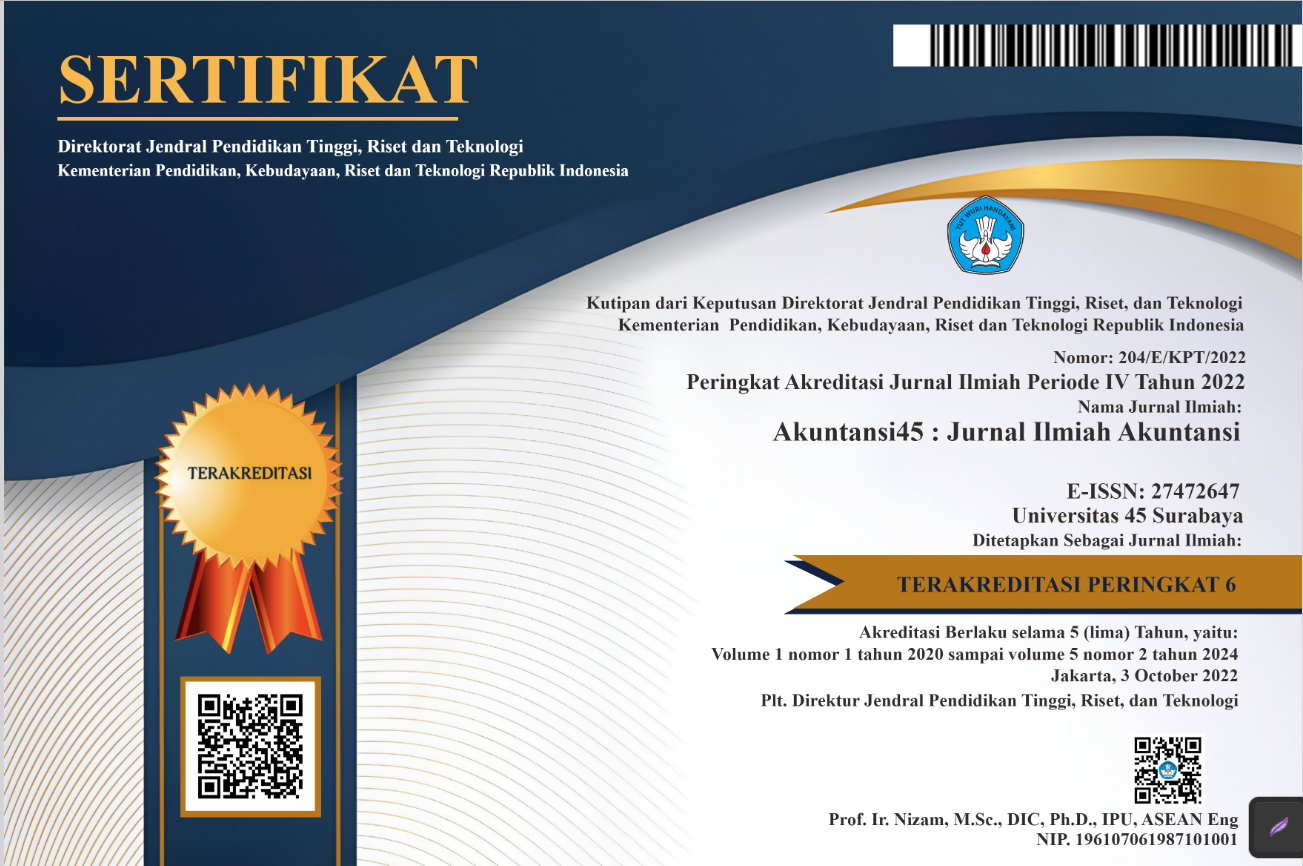Evaluasi Dampak Investasi Sosial: Analisis SROI pada Intervensi Dana Hibah Penelitian dan Pengabdian Akademisi Perguruan Tinggi Ke Bisnis Sosial
(Studi Kasus Akademisi Universitas Ma Chung ke Kelompok Tani Kopi Republik Tani Mandiri)
DOI:
https://doi.org/10.30640/akuntansi45.v5i2.3390Keywords:
Effectiveness, Programs, Business, SocialAbstract
This study evaluates the effectiveness of the Republic Tani Mandiri (RTM) social business program using the Social Return on Investment (SROI) approach. The research focuses on the RTM Coffee Farmers Group, an initiative in coffee agriculture. A mixed-method approach with a subsequential exploratory design was employed. The analysis reveals that an initial investment of IDR 279,756,965 has not yet yielded positive short-term results, with an SROI ratio of 1:0.25. This indicates that each IDR 1 invested generates a social, economic, and environmental impact valued at IDR 0.25. Although this ratio is lower than anticipated, the program’s social and economic impacts remain significant. Positive changes were observed among coffee farmers in Desa Kucur, who experienced improved coffee quality and selling prices with support from Universitas Ma Chung. However, to ensure sustained benefits, ongoing support and strategic adjustments are necessary. The findings are expected to encourage continued support for similar initiatives in the future.
References
Edmonds, E. (2018). Case Studies and Lessons. 47–62. https://doi.org/10.1007/978-3-031-02222-7_5
Emerson, J., & Twersky, F. (1996). New social entrepreneurs: The success, challenge and lessons of non-profit enterprise creation. (No Title).
Habibi, U., & Syamilah, N. (2019). Dampak Penyaluran Dana Ziswaf (Zakat, Infaq, Sedekah Dan Wakaf) Pada Program Pendidikan Stid Mohammad Natsir Berdasarkan Social Return on Investment. Jurnal Bina Ummat: Membina Dan Membentengi Ummat, 2(01), 1–26. https://doi.org/10.38214/jurnalbinaummatstidnatsir.v2i01.38
Kucur, R. (2023). Kelompok Tani Kopi Republik Tani Mandiri (RTM). https://kopikoetjoer.vercel.app/
Lindawati, L. (2018). Kekuatan Cerita dalam Bisnis Sosial (Sociopreneur is A Storyteller). Jurnal Studi Pemuda, 7(2), 100. https://doi.org/10.22146/studipemudaugm.39643
Nicholls, J., Lawlor, E., Neitzert, E., Goodspeed, T., & Cupitt, S. (2012). A guide to Social Return on Investment: The SROI network. Accounting for Value.
Purwono, F. H., Ulya, A. U., Purnasari, N., & Juniatmoko, R. (2019). Metodologi Penelitian (Kuantitatif, Kualitatif dan Mix Method). Guepedia.
Rahardjo, M. (2017). STUDI KASUS DALAM PENELITIAN KUALITATIF: KONSEP DAN PROSEDURNYA. Occupational Medicine, 53(4), 130.
Riahi, A. D. B. (2011). Accounting Theory Edisi 5. Salemba Empat. Jakarta Selatan.
Saleh, S. (2017). Analisis data kualitatif. Pustaka Ramadhan, Bandung.
Silalahi, D. C. G., Santoso, H., & Suliantoro, Y. (2018). Analisis Social Return on Investment Pada Kewirausahaan Sosial: Studi Kasus di Upreneur Aiesec Undip. Industrial Engineering Online Journal, 7(2), 1–19. https://ejournal3.undip.ac.id/index.php/ieoj/article/view/20769
Stein, D., & Valters, C. (2012). Understanding theory of change in international development.
Story, W. (2021). Story of Change. https://vimeo.com/70921687
Teguh Soedarto, M. P., & Huda, I. N. (2023). KELEMBAGAAN PETANI KOPI. Uwais Inspirasi Indonesia.
Wijaya, O., Susanto, D. A., Rozaki, Z., & Nurhidayati, A. P. (2021). Dampak Investasi Sosial Pelaksanaan Corporate Social Responsibility (CSR) terhadap Pengembangan Agribisnis Jamur dengan Pendekatan Social Return on Investment (SROI). Jurnal Ekonomi Pertanian Dan Agribisnis, 5(4), 1270–1279.
Yasin, H. (2015). Upaya strategis pemberdayaan ekonomi masyarakat melalui kelompok usaha bersama (KUBE). Jurnal Administrasi Publik, 5(1), 38–42.
Downloads
Published
How to Cite
Issue
Section
License
Copyright (c) 2024 AKUNTANSI 45

This work is licensed under a Creative Commons Attribution-ShareAlike 4.0 International License.









